2020年外研版英语中考一轮教材复习课件七上 Modules 6-10
文档属性
| 名称 | 2020年外研版英语中考一轮教材复习课件七上 Modules 6-10 | 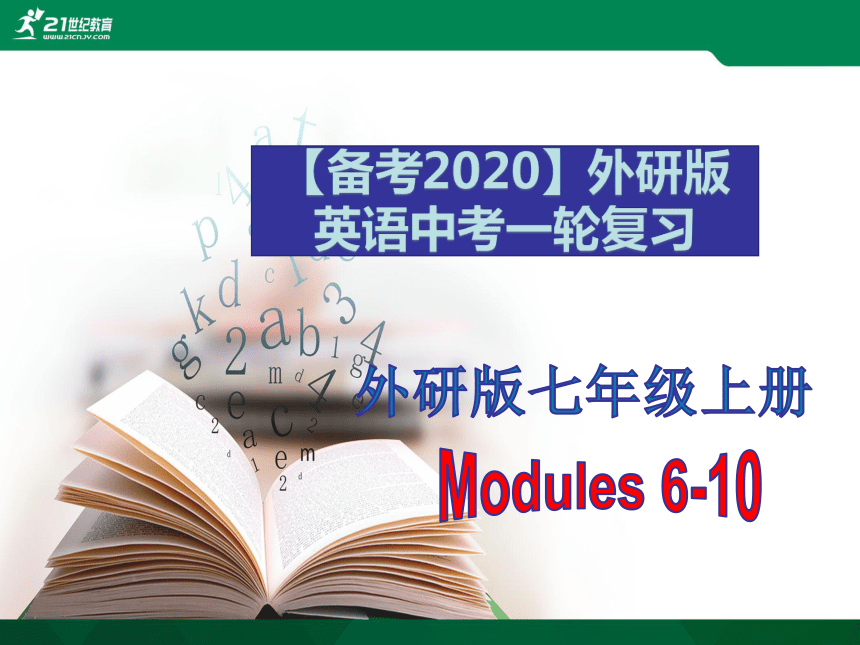 | |
| 格式 | zip | ||
| 文件大小 | 2.3MB | ||
| 资源类型 | 试卷 | ||
| 版本资源 | 外研版 | ||
| 科目 | 英语 | ||
| 更新时间 | 2020-01-16 10:00:02 | ||
图片预览

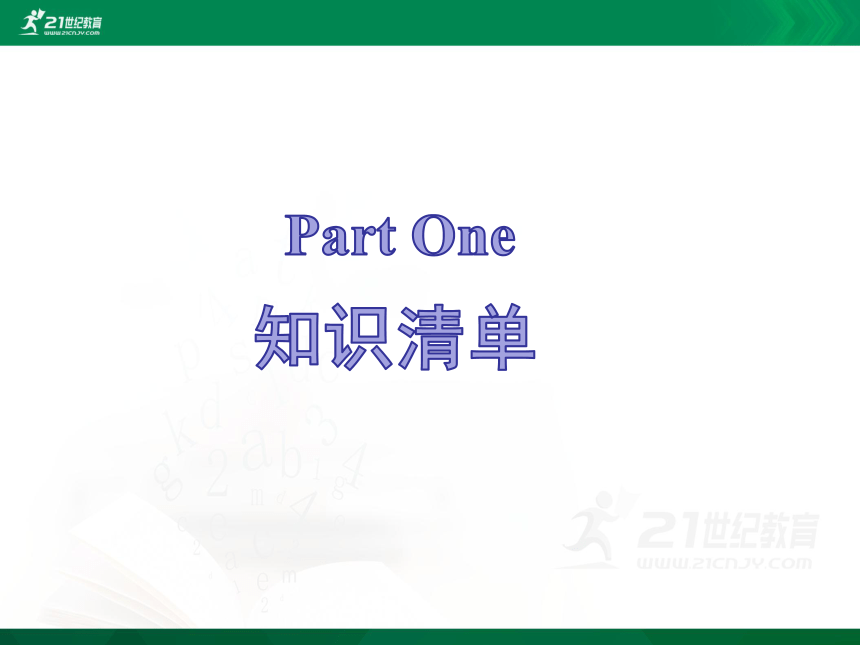
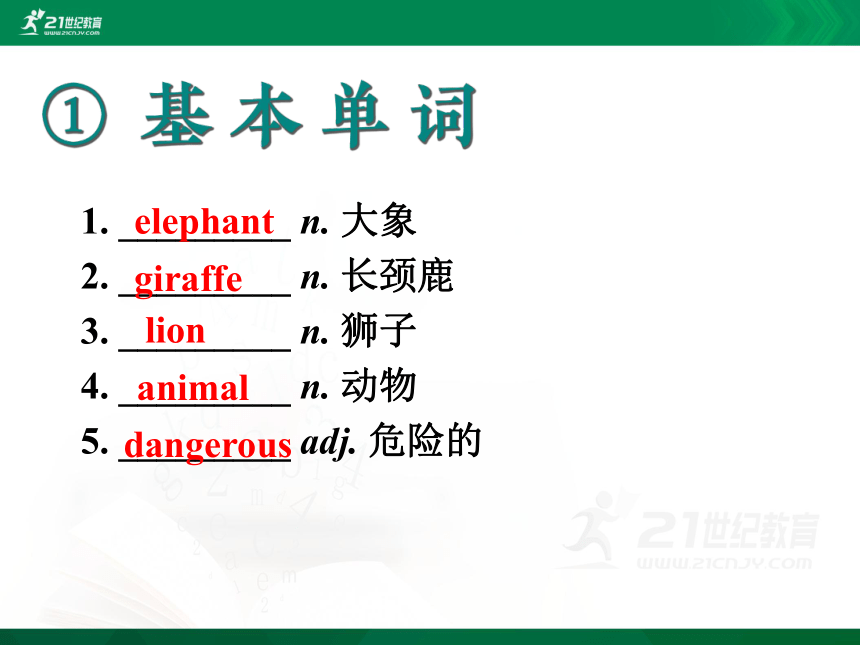
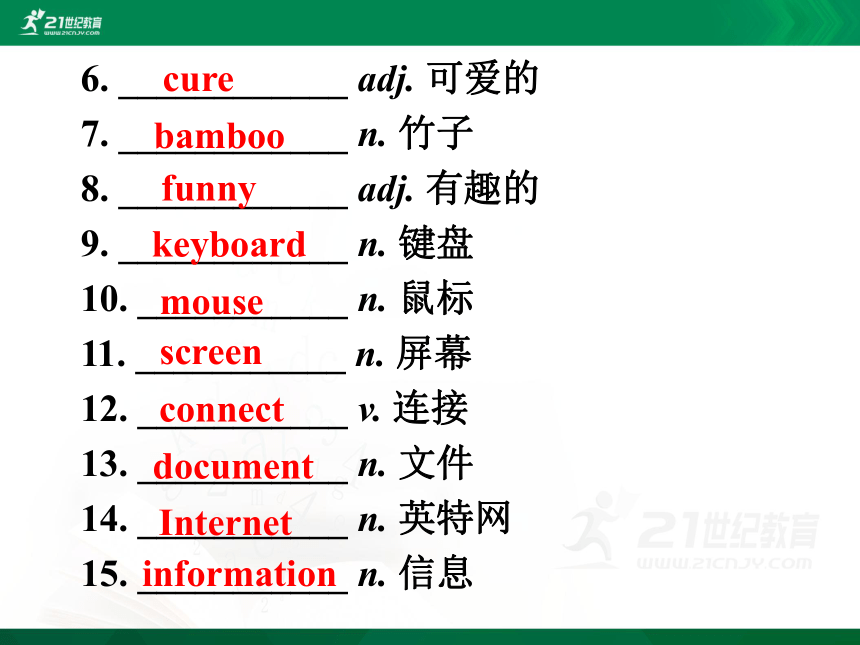
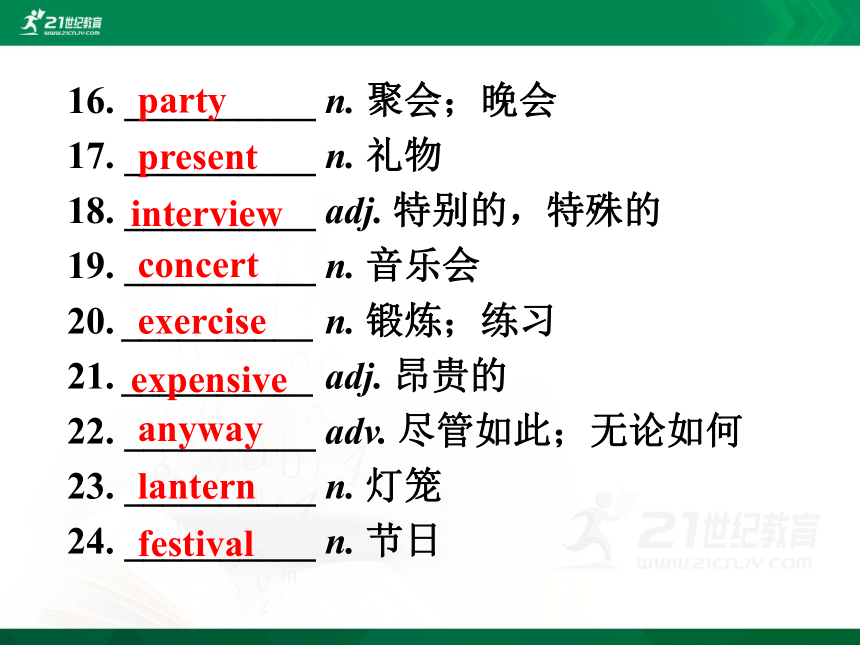
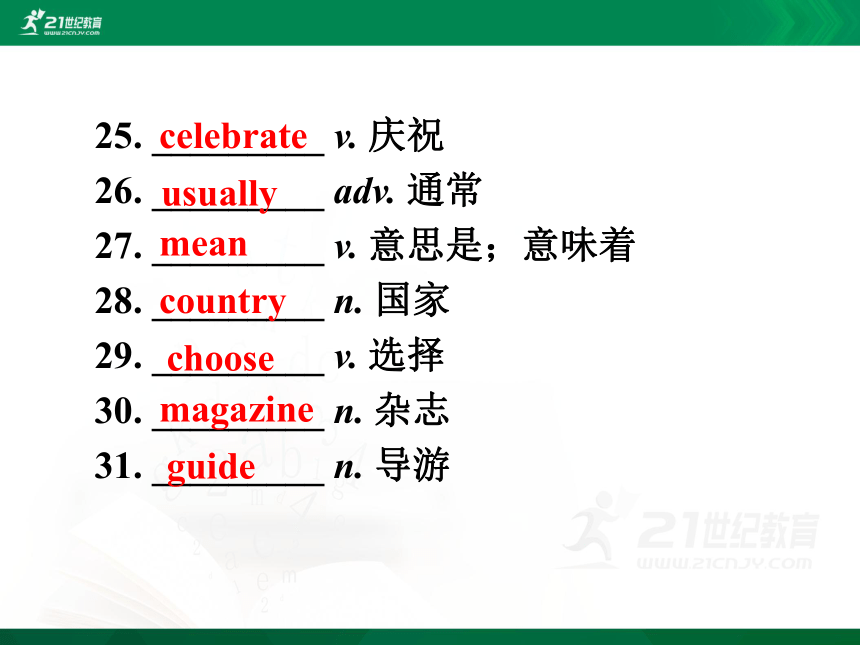

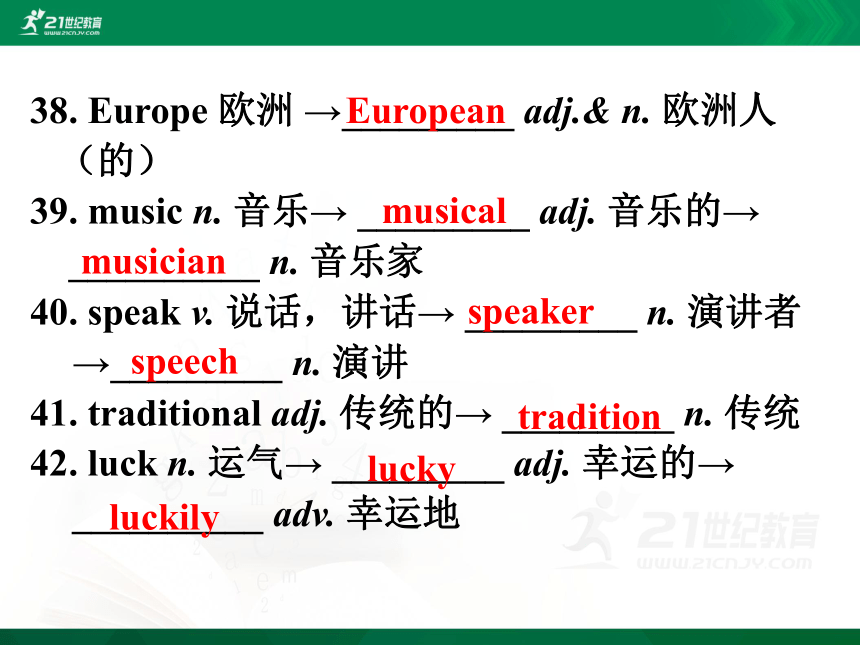
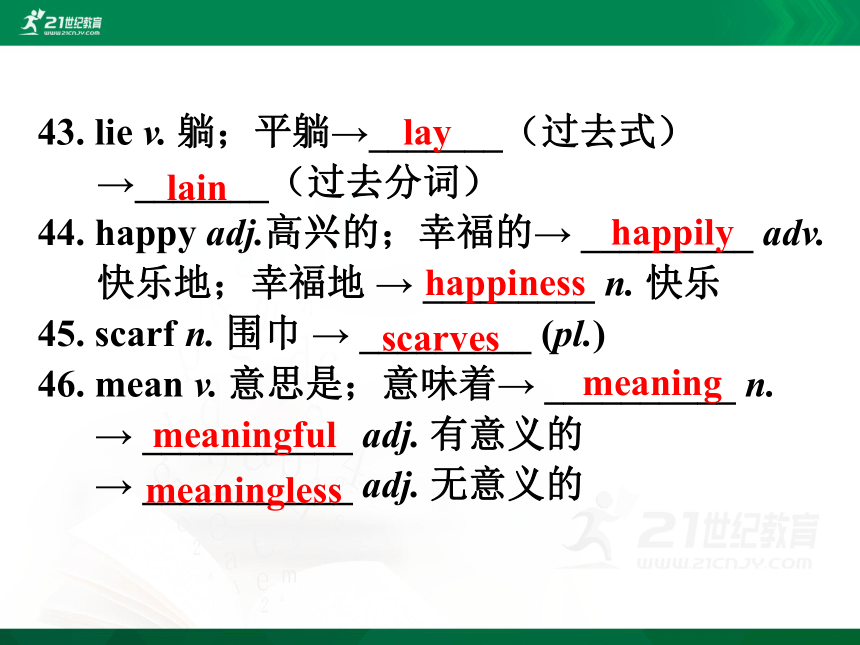
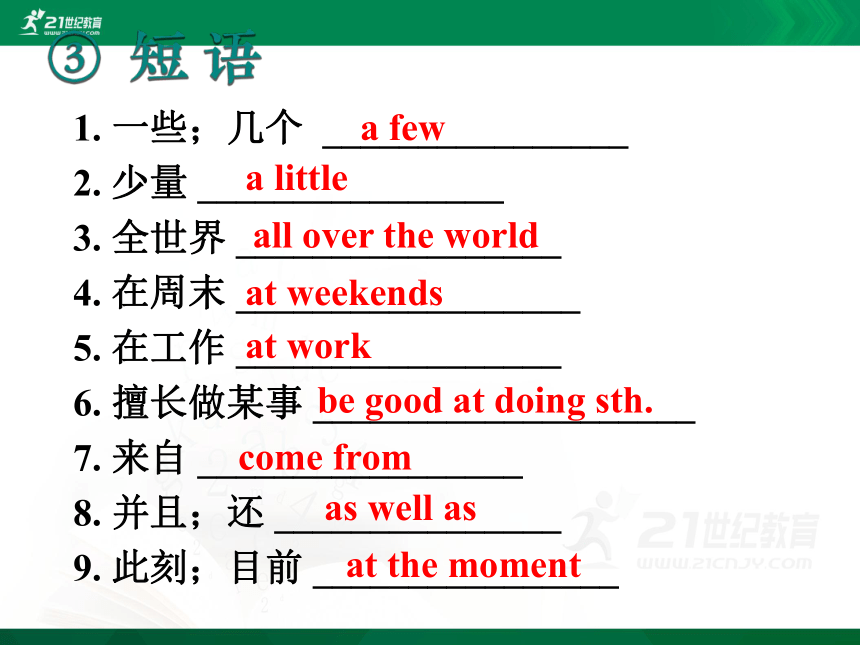
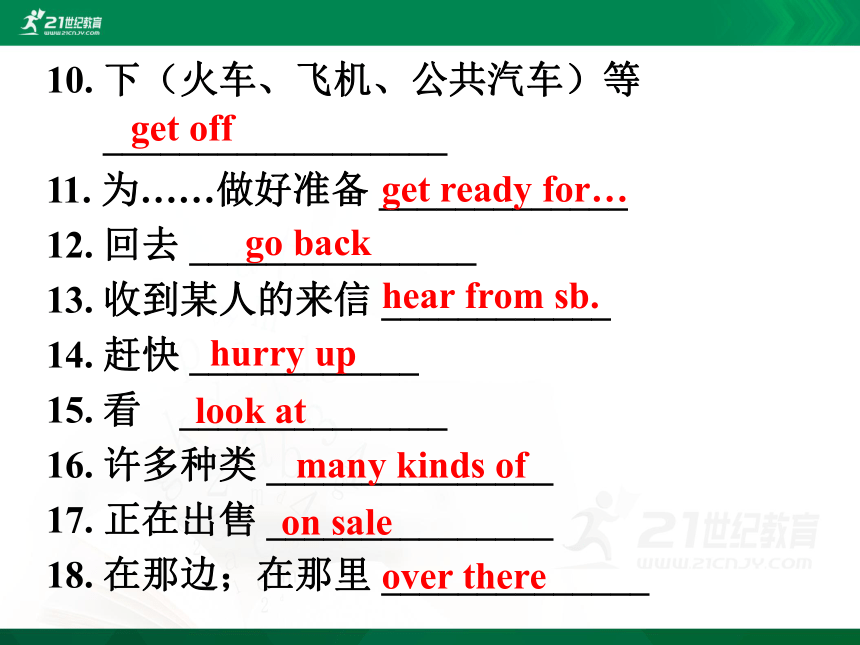
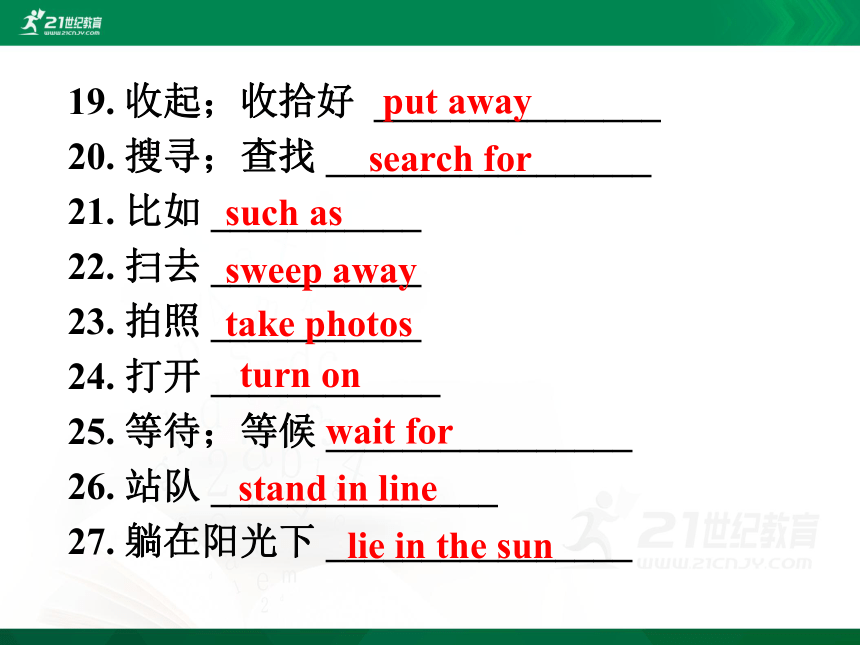
文档简介
课件107张PPT。Modules 6-10外研版七年级上册【备考2020】外研版英语中考一轮复习Part One知识清单1. _________ n. 大象
2. _________ n. 长颈鹿
3. _________ n. 狮子
4. _________ n. 动物
5. _________ adj. 危险的elephantgiraffelionanimaldangerous6. ____________ adj. 可爱的
7. ____________ n. 竹子
8. ____________ adj. 有趣的
9. ____________ n. 键盘
10. ___________ n. 鼠标
11. ___________ n. 屏幕
12. ___________ v. 连接
13. ___________ n. 文件
14. ___________ n. 英特网
15. ___________ n. 信息curefunnykeyboardscreendocumentconnect bamboomouseInternetinformation16. __________ n. 聚会;晚会
17. __________ n. 礼物
18. __________ adj. 特别的,特殊的
19. __________ n. 音乐会
20. __________ n. 锻炼;练习
21. __________ adj. 昂贵的
22. __________ adv. 尽管如此;无论如何
23. __________ n. 灯笼
24. __________ n. 节日expensiveexercisepartyinterviewconcertanywaypresentlanternfestival25. _________ v. 庆祝
26. _________ adv. 通常
27. _________ v. 意思是;意味着
28. _________ n. 国家
29. _________ v. 选择
30. _________ n. 杂志
31. _________ n. 导游meancelebrate usuallycountrychoosemagazineguide32. dangerous adj. 危险的→_________ n. 危险
33. leaf n. 叶子→ _________ (pl.)
34. different adj. 不同的→ _________ n. 不同
点;差异
35. little adj. 极少量的→ _______(比较级)→
______(最高级)
36. Africa 非洲→ ________ adj. & n. 非洲人
(的);非洲的
37. sale n. 卖;出售→ ________ v. 卖dangerleavesdifferencelessleastAfrican sell38. Europe 欧洲 →_________ adj.& n. 欧洲人
(的)
39. music n. 音乐→ _________ adj. 音乐的→
__________ n. 音乐家
40. speak v. 说话,讲话→ _________ n. 演讲者→_________ n. 演讲
41. traditional adj. 传统的→ _________ n. 传统
42. luck n. 运气→ _________ adj. 幸运的→ __________ adv. 幸运地Europeanmusicalmusicianspeakerspeechtraditionluckilylucky43. lie v. 躺;平躺→_______(过去式)→_______(过去分词)
44. happy adj.高兴的;幸福的→ _________ adv. 快乐地;幸福地 → _________ n. 快乐
45. scarf n. 围巾 → _________ (pl.)
46. mean v. 意思是;意味着→ __________ n.
→ ___________ adj. 有意义的
→ ___________ adj. 无意义的laylainhappilyhappinessscarvesmeaningmeaningfulmeaningless1. 一些;几个 ________________
2. 少量 ________________
3. 全世界 _________________
4. 在周末 __________________
5. 在工作 _________________
6. 擅长做某事 ____________________
7. 来自 _________________
8. 并且;还 _______________
9. 此刻;目前 ________________a fewa littleall over the worldat weekendsat workbe good at doing sth.come fromas well asat the moment10. 下(火车、飞机、公共汽车)等 __________________
11. 为……做好准备 _____________
12. 回去 _______________
13. 收到某人的来信 ____________
14. 赶快 ____________
15. 看 ______________
16. 许多种类 _______________
17. 正在出售 _______________
18. 在那边;在那里 ______________get off go backget ready for… over there hear from sb.hurry uplook atmany kinds ofon sale19. 收起;收拾好 _______________
20. 搜寻;查找 _________________
21. 比如 ___________
22. 扫去 ___________
23. 拍照 ___________
24. 打开 ____________
25. 等待;等候 ________________
26. 站队 _______________
27. 躺在阳光下 ________________put awaysearch for such assweep awaytake photosturn onwait forstand in linelie in the sun28. 做饭 ___________________
29. 因为 _________________
30. 搜索信息 ______________________
31. 打开一个新文件 ____________________
32. 保存文件 ____________________
33. 上网 ___________________
34. 发送邮件 ______________cook the mealbecause ofsearch for informationopen a new document save the document go on the Internetsend emails 1.?Here are?the lions.
2.?There she is!
3.?How do I?write my homework on the computer?
4.?Is this it?
5.?What’s next?
6.?When is it?
7.?What do you usually do?at a Chinese birthday party?8.?What would you like for?your birthday?
9.?It’s a secret.
10.?I’d like?a postcard too.
11.?We’re enjoying?the school trip?a lot.
12.?Anyway, it’s time to?go back to school?now.
13.?This is?Tony?speaking.
14.?What’s happening?
15.?What are you doing?at the moment?
16.?Can I?join them?
17.?Hurry up!Part Two核心要点1. different adj. 不同的【拓展】different反义词be different from…
和……不同派生词difference n. 不同;差异different adv. 不同地same adj. 相同的短语【语境应用】根据所给提示完成句子。每空一词,含缩略词。
在某些方面,我和我妹妹完全不同。
In some ways, I am quite ________ ________ my sister. (2018 新疆) different from 2. other adj. 其他的 (后接可数名词复数形式)
【拓展】“other+复数可数名词”=others
泛指剩余中的一部分“the other+复数可数名词”= the others
特指剩下的去全部one…the other…
(两者中)一个……另一个……other3. also adv. 也;而且
【辨析】also, too与either【语境应用】用also, too或either填空。
(1) He ________ likes swimming.
(2) She is a student, ________.
(3) I don’t like black. She doesn’t like it,
_________.alsotooeither4. little adj. 极少量的(修饰不可数名词,表否定)
【拓展】有点儿;稍微→修饰形容词或副
词,和a little bit, a
bit, kind of同义。a little少量→修饰不可数名词5. alone adv. 独自地
【辨析】alone与lonely 【语境应用】用alone或lonely填空。
(1) Don’t leave the baby _______ at home.
(2) When his wife and two little children left him,
he was very _______.
(3) I never feel _______ because I have a lot of
friends here.
(4) The old man lives ________, but he
never feels _______.alonelonelylonelyalonelonely6. connect v. 连接
connect…to/ with… 把……与……连接
【辨析】connect A with B和 connect A to B【语境应用】完成句子
A good student connects what he reads _________ what he sees around him.with7. turn n. 转动
turn on 打开;接通(电源、电器)turn短语turn on 打开turn off 关闭turn into 变成;变为turn in 上交turn up 调高turn down 调低【辨析】turn off/ on与open/ close【语境应用】单项选择
Grandma wants to watch the program Legal Report. Please _________ the TV.
A turn off B turn on C turn downB8. learn v. 学;学习
【拓展】learn常见用法:learn from sb. 向某人学习
learn to do sth. 学习做某事
learn about 得知;了解learn短语9. search v. 搜寻;搜索;查找
search for 搜寻;查找
【辨析】 search与search for【语境应用】根据句意和汉语提示写出所缺单词。
We can _________(搜寻) for information on the Internet.search10. information
information是不可数名词,不能直接与不定冠词a或an连用。若要表达“一条信息”,用a piece of information;表达“两条信息”要用two pieces of information。
【拓展】
information后面常接介词on或about, 表示“关于……的信息”。【辨析】information与news【语境应用】单项选择
—How can I get some _______ about the 2020 Olympic Games?
—Why not search the Internet?
A information B experience C practiceA【辨析】sometimes, sometime, some time与some times 11. sometimes adv. 有时候;有时12. give v. 给,送
give后面常跟双宾语(指人的方向为间接宾语,指物为直接宾语)。
give sb. sth.=give sth. to sb. 给某人某物
注意:若直接宾语为代词时,只能用“give sth. to sb.”结构。
【拓展】与give用法类似的单词还有send, show, pass等。buy, make后面也可以跟双宾语,只是直接宾语在前时,后面的介词要用for。【语境应用】单项选择
It’s too hot today. Please give _______ a bottle of orange juice.
A my B he C her D hisC13. choose v. 选择;挑选
【归纳】choose为及物动词,后面接名词作宾语。表示选择的范围时,可以根据句意选用不同的介词,如from, between。
choose to do sth. 选择做某事
choose sb. to do sth. 选择某人去做某事
choose…as… 选……作为……
【拓展】
同根词:choice n. 选择【语境应用】根据所给汉语将下面句子补充完整。(每空一词)
我们应该允许青少年选择他们自己的服饰。
We should _______ teenagers to _______ their own clothes. allowchoose14. spend v. 花钱;花费
spend+时间/金钱+ (on) doing sth.
花费时间或金钱做某事
spend+时间/金钱+ on sth.
花费时间或金钱在某物上【辨析】花费 spend/pay/cost/take【语境应用】单项选择
It’s very nice of you to ______ so much time _______ me around your school.
A cost; to show B pay; for
C spend; to show D spend; showingDe.g. A rooster lying on the ground lied that he laid an egg yesterday.
一只躺在地上的公鸡撒谎称它昨天下了一个蛋。15. lie v. 躺;平躺【语境应用】读下列句子,根据语境推断划
线部分单词的不同含义。
1) Freezing weather in spring affected the hens’ ability to?lay.
2) The village?lies?in a small wooded valley.
3) You could see from his face that he was?lying.
4) The doctor says that Mary must lie down and rest an hour every afternoon. 下蛋???位于?说谎?躺下16. leave v. 离开
后可接表示地点的名词或副词。
leave for 动身前往
【拓展】
leave还表示“遗留、遗忘”,常于地点副词连用,意为“把某物忘在/落在某处”。【语境应用】(2018山东莱芜中考)
—Oh, dear! I can’t find my key to the office.
—Don’t worry. I think you might _____ it in
your car.
A offer B forget C borrow D leaveD17. study v. 学习;研究
及物动词,后接名词作宾语。也可作不及物动词,“学习”。
【辨析】study与learn
study侧重深度研究及深入、系统地学习,强调主观努力学习的动作。
learn多指初学阶段或模仿性的技术操作,强调学习的结果。
【运用】用study,learn适当形式填空。
1) They _______ medicine in the university.
2) She will _______ to ride a horse this year.studylearn18. join v. 参加;加入
【拓展】
join…in/ for 和……一起……,和……做伴
【辨析】join, take part in, attend【语境应用】根据句意及汉语提示,补全单词。
You’re good at drawing. Why not __________(加入) our school art club? join 19. hurry v. 匆忙;赶快
【归纳】
hurry up 赶快 (用于祈使句)
hurry to+地点名称 匆忙去某地
hurry to do sth. 匆忙做某事
【拓展】
hurry n. 匆匆忙忙,仓促,赶时间
in a hurry 匆忙地1. as well as 并且,还
连接两个并列成分,表示“除……之外,……也;不但……而且……”。强调的是前一项,所以链接两个并列主语时,谓语动词要与前一项保持一致。
【拓展】as well as还可表示同级比较,指“和……一样好”。2. be good at 擅长
at后可接名词、代词或v.-ing形式,同义词组为do well in。【语境应用】用括号内所给动词的正确形式填空。
My cousin is good at _________(dance).
(2018 江苏徐州) dancing 3. go back 回去
go back 强调动作
be back 返回 (强调状态)
【拓展】back 短语 get back 回来,返回come back 回来 call back 回电话 walk back 走回来 walk back 走回来 4. sweep away 扫去
【拓展】“动词+away”短语小结go away 走开;离开throw away 扔掉;丢弃give away 捐赠;捐给take away 带走;拿走run away 逃跑blow away 吹走动词+away1. —Shall we go and see them?
— Yes, let’s go.
Shall we/ I …? “我们/ 我……好吗?”后接
动词原形,表示征求对方的意见。
肯定回答:Yes, let’s…/ OK./ Good idea./
Sure.
否定回答:No, let’s…
【拓展】 提建议的方式:
Shall we do sth.?
What/ How about doing sth.?
Let’s do sth.!2. How do I write my homework on the computer?
特殊疑问句结构:特殊疑问词+一般疑问句?
特殊疑问词:how, what, when, where, how many。3. First, open a new document…Next, you write your homework… then click “save”…Finally…
描述动作过程的先后顺序,常用副词first, next, then, finally等。4. Hi, would you like to come to my birthday
party?
Would you like…?用来询问对方意见、邀请或请求别人做某事的一种委婉表达。比同义表达“Do you want…?”更有礼貌。
肯定句:主语+would like +to do sth.
否定句:主语+would not like+ to do sth.
注意:肯定句中,would常与前面的主语缩写’d。5. Anyway, it’s time to go back to school now.
1) anyway为副词,“无论如何,反正”,
用于转换话题或结束谈话。anyway作
副词时,还表示“不论以何种方式”。
2) It’s time to do sth. 到做某事的时间了
It’s time for+名词 到……的时间了6. I’m visiting my friends in Hollywood at the moment…
at the moment 现在,此时
【拓展】
at this moment 在这个时候
at that moment 在那个时候
in a moment 一会儿,马上7. This is Tony speaking.
打电话常用语。打电话问对方是谁用“Who’s that?”或“Who’s that speaking?”;回答自己是谁用“This is …”或者“This is …speaking”。
【拓展】打电话常用语:
Hello, this is …
May I speak to…please?
Who’s that speaking?/ Who’s that?Part Three语法要点一般现在时用法
1. 一般现在时表示经常性或习惯性的动作或事物存在的状态,常与always, often,
usually, sometimes, once a week, every day等频度副词或时间状语连用。如:
My mum often gets up at 6 o'clock in the
morning. 2. 一般现在时表示主语具备的性格和能力
等。 如:
He is good at English.
3. 一般现在时表示客观事实或普遍真理。
如:
The sun rises in the east.
4. 一般现在时表示将来:
1) 表示将来确定会发生的动作(如已安排或计划好的动作),go, come, leave, start, arrive, be等动词常可以这样使用。如:
The train leaves at 7:30 p.m. 2) 在时间或条件等状语从句中,用一般现在时表示将来的动作。如:
I’ll let you know as soon as I hear from him.
He’ll go if it is fine tomorrow.
5. 在某些以here, there开头的句子中用一般现在时表示正在发生的动作。如:
Here comes the bus.结构现在进行时用法
1. 现在进行时表示说话时正在进行或发生的动作。如:
Mr. Smith is giving a talk now.
Is it raining now?
2. 现在进行时表示当前一段时间内的活动或现阶段正在进行的动作。如:
We’re preparing for the project these days.结构1. The world is changing with every second; and China, too, ______with every second.
(2019 湖南株洲)
A. is changing B. had changed
C. changed
2. —May I speak to Mrs. Smith?
—Sorry,she the clothes.
(2019湖南怀化)
A. is washing B. washes C. washAA3. Sam ______ with his friends every weekend.
(2019 北京)
A. skates B. is skating
C. has skated D. was skating
4. —What is your mother doing, Linda?
—She ______ dinner in the kitchen now.
(2019 江苏淮安)
A. is cooking B. was cooking
C. cook D. cookingAA5. —Could you help me clean the floor, Bob?
—Wait a moment. I ______ for some
information about the World Cup.
(2018 山东莱芜)
A. search B. have searched
C. am searching D. was searching
6. I ______ up at 6:30 every morning.
(2018 广西柳州)
A. get B. got C. will getCA7. Reading books ______ a bridge between our lives and the unknown world.
(2018 贵州贵阳)
A. built B. build C. builds
8. —Kitty, I’m busy cooking. Can you give
me a hand?
—Mum, just wait a moment. I _______
my bed now. (2018 广西百色)
A. make B. will make
C. am making D. makingCCPart Four交际用语一、建议(Suggestions)
Shall we go and see them?
What / How about bears?
Let’s go and have a look.
Why don’t you buy a computer?
Why not go to a movie?二、同意和不同意
(Agreement and disagreement)
Sure.
Of course!
Certainly.
That’s a good idea.
I don’t think so.
I don’t agree. 三、邀请(Invitation)
1. —Would you like to come to my
birthday party?
—Yes, I’d love to. / I’d love to, but I’m
afraid I have no time.
2. —How / What about having a swim?
—OK. / Thank you. / No, thank you.四、喜欢和不喜欢(Likes and dislikes)
This book is very interesting.
Tony’s sister likes music.
Betty’s cousin likes reading.
I’m interested in science.
I don’t like the movie very much/at all.
I hate to do homework.根据对话内容从方框中选择能填入空白处的最佳选项补全对话,其中有两项多余。 A. Come and help me.
B. What are you doing now?
C. You can make dumplings.
D. What festival do you like?
E. Spring Festival is coming!
F. My mother will teach you.
G. Who is making dumplings?AA: Hello, Li Fang. This is Mary speaking. (1)________
B: I'm cleaning my bedroom for the festival.
A: What festival?
B: (2)________ Don't you know that?
A: Sorry, I'm quite busy these days.A. Come and help me.
B. What are you doing now?
C. You can make dumplings.
D. What festival do you like?
E. Spring Festival is coming!
F. My mother will teach you.
G. Who is making dumplings?B E B: You need to relax. (3)________
A: OK. What can I do?
B: (4)________
A: Great! I love dumplings. But I can't make them.
B: Don't worry. (5)________
A: OK! See you!A. Come and help me.
B. What are you doing now?
C. You can make dumplings.
D. What festival do you like?
E. Spring Festival is coming!
F. My mother will teach you.
G. Who is making dumplings?A C F BA. What about you?
B. Where's the zoo?
C. What about going to the zoo?
D. I think the lion is dangerous.
E. The zoo is very far from here.
F. My favourite animal is the lion.
G. Is the panda your favourite animal?A: It's Saturday tomorrow. (1)________
B: Good idea! What animals do you like?
A: I like the panda and the monkey. (2)________
B: I like the lion and the giraffe. (3)________C A G A. What about you?
B. Where's the zoo?
C. What about going to the zoo?
D. I think the lion is dangerous.
E. The zoo is very far from here.
F. My favourite animal is the lion.
G. Is the panda your favourite animal?A: Yes. It is black and white and looks very lovely.
B: That's right.
A: What's your favourite animal?
B: (4)________
A: Really? (5)________
B: But I think it's beautiful.F D Part Five话题写作节假日活动——节日与假日 【写作任务】(改编自2018甘肃兰州书面表达)
假设你是李华,今天正逢端午节,你的英国笔友Jack对中国传统文化很感兴趣,写信向你询问端午节的有关情况。请你根据以下内容提示,给他写一封回信。
1.?中国的传统节日之一,已有2000多年的历史(the Dragon Boat Festival; one of the Chinese traditional festivals; two thousand years of history);2.?为了纪念著名诗人屈原(honor the great poet Qu Yuan);
3.?中国南方有赛龙舟的习俗(Dragon Boat races);
4.?家人团聚吃粽子和其他美食(eat zongzi and other delicious food);
5.?有三天假期,可以外出旅游(a 3-day holiday)。要求:1. 80词左右,书信格式;
2.?内容合理,要点齐全;句子及篇章
结构正确、连贯;书写规范。
【思路点拔】
1.?定基调
体裁:应用文(书信);书信的主体部分为说明文??????????
时态:以一般现在时为主
人称:以第三人称为主2.?谋布局、写句子 people often get together with their familya 3-day holidayHow interesting the Dragon Boat Festival is3.?巧衔接
(1)在写作过程中,可运用besides (除了), also, and等词来衔接上下文,以增强文章的层次感。
(2)当上下句有因果关系时,可以用so来连接,使文章过渡自然,增强逻辑性。4.?成篇章
Dear Jack,
How's it going? I am very glad to introduce the Dragon Boat Festival to you. It is one of the Chinese traditional festivals. It has over two thousand years of history. The festival is celebrated to honor the great poet Qu Yuan. On that day, people often get together with their family to eat?zongzi?and other delicious food. In the southern parts of?China, people often have the Dragon Boat races. It is so exciting to watch this activity on TV.?Besides, we?also?have a 3-day holiday during the festival.?So?we can have a short journey to relax. How interesting the Dragon Boat Festival is?and?I like it very much.
Best wishes!
Yours,
Li Hua5.?化“平凡”为“非凡”
The festival is one of the Chinese traditional festivals. The festival has over two thousand years of history.
→The festival is one of the Chinese traditional
festivals with a history of over two thousand
years.Part Six巩固练习Ⅰ.?根据语境及所给汉语提示语写出所缺单词。
1. I have ________(从不) been to London. I hope to visit it one day.
2. Don't swim in the river. It's ________(危险的).
3. Jane bought two ________(围巾) for her mother yesterday.??
4. Mike _______(计划) to be a pilot in the future.
5. Susan has ________(检查) her homework twice.dangerous?checked?plansscarves?never Ⅱ.?根据语境及所给首字母提示补全所缺单词。
1. D________ is the last month of a year.
2. Ann is an American girl and she s________ English.
3. I can't afford the computer because it is too e________.
4. —Dose Mr Smith live a________?
—No. He lives with his grandson.
5. —Do you have your own bedroom at home,
Mike?
—No. I s________ one with my brother.share?alonespeaksDecember expensive 1. It's late. Let's ________________ home now.
2. ________________, Jenny! The train is leaving.
3. ________________ vegetables are on sale in the supermarket.
4. Mr Wang usually goes fishing ________________.go back, hurry up, take photos, many kinds of, as well as, at weekendsⅢ.?根据语境从方框中选择恰当的短语填空,有的需要变换形式。Many kinds of?at weekends?go back?Hurry up?5. My brother can play football ________________ basketball.
6. My grandfather is interested in ________________.go back, hurry up, take photos, many kinds of, as well as, at weekendsas well as?taking photos?Ⅳ.?根据括号内的要求完成下列各题,每空一词(含缩略形式)。
1. They are preparing for the exam these days.? (改为否定句)
They ________ ________ for the exam these days.
2. The girl comes from?England. (改为否定句)
The girl ________ ________ from?England.
3. Mike has noodles for dinner. (改为一般疑问句)
________ Mike ________ noodles for dinner?doesn't comearen't preparingDoes have?4. Tom is doing his homework now. ?(改为一般疑问句)
________ Tom ________ his homework now?
5. The boy?under the tree?is my friend.? (对划线部分提问)
________ ________ is your friend?
6. Mrs Smith is?reading?in the bedroom. ?(对划线部分提问)
________ Mrs Smith ________ in the bedroom?Is doing?What's doingWhich boy Ⅴ.?根据上句完成下句,使上下两句意思相同或相近,每空一词。
1. How about going swimming tomorrow?
________ we ________ swimming tomorrow?
2. They are not in the same school.
They are in ________ ________.
3. I receive my cousin's letter once a week.
I ________ ________ my cousin once a week.
4. Tony plays chess very well.
Tony is ________ ________ playing chess.different schoolsShall go?good at?hear from?5. It takes me two hours to learn English every day.
I ________ two hours ________ English every day.
6. I have some relatives in?Tianjin.
I have ________ ________ relatives in?Tianjin.a few?Spend learningⅥ.?根据汉语意思完成英语句子,每空一词(含缩略形式)。
1.?现在该打扫房间了。
________ ________ ________ clean the room now.
2.?看!他在那儿。
Look! ________ ________ ________.
3.?刚才他在卧室里收拾他的玩具。
Just now he ________ _______ his toys in the bedroom.There he is?It's time to?put away?4.?老师们正在为这次会议做准备。
The teachers are ________ ________ ________ the meeting.
5.?我不知道此刻那边正发生什么事。
I don't know ________ ________ over there at the moment.
6.?我想要一辆自行车作为生日礼物。
________ ________ ________ a bike as a birthday gift. getting ready
forI would like?what's happening “I think we're being followed, Ben,” said Julie. “They've been behind us since we stopped (1)_______ lunch.”
Two hours ago we ate at a (2)_______ roadside restaurant and had to share a table with other tourists. Ⅶ. 阅读短文,从方框中选择恰当的单词并用其适当形式填空,使短文通顺,意思完整,每词限用一次。crowded, final, leave, car, read, for, wrong, and, ask, wefor?crowdedJulie (3)_______ our hire-car (租车) keys on the table and had to go back in to get them. Then, outside in the car park, we couldn't remember which car was (4)_______, so we pressed the remote control (按遥控器) on the key and listened for the sound of doors unlocking.
We had driven since then. I was busy (5)_______ the map and didn't notice that there was a silver Renault behind us. crowded, final, leave, car, read, for, wrong, and, ask, weleft?ours?readingJulie started turning this way and that until (6)_______ the silver Renault was no longer behind us. However, by this time, we were completely lost.
“We'd better stop (7)_______ directions,” I said, so we stopped at a shop. While Julie was trying to make herself understood to the shop owner, I saw another (8)_______ stop behind ours. It was the silver Renault! crowded, final, leave, car, read, for, wrong, and, ask, wefinally?to askcar?I noticed for the first time that our hire-car was the same model as that one. The door opened (9)_______ a man got out.
I warned Julie and she turned round just in time to see the driver walking into the shop. He was holding out some car keys similar to ours. “You took the (10)_______ keys at lunchtime,” he said.crowded, final, leave, car, read, for, wrong, and, ask, weand?wrong谢谢21世纪教育网(www.21cnjy.com) 中小学教育资源网站 有大把高质量资料?一线教师?一线教研员?
欢迎加入21世纪教育网教师合作团队!!月薪过万不是梦!!
详情请看:
https://www.21cnjy.com/help/help_extract.php
2. _________ n. 长颈鹿
3. _________ n. 狮子
4. _________ n. 动物
5. _________ adj. 危险的elephantgiraffelionanimaldangerous6. ____________ adj. 可爱的
7. ____________ n. 竹子
8. ____________ adj. 有趣的
9. ____________ n. 键盘
10. ___________ n. 鼠标
11. ___________ n. 屏幕
12. ___________ v. 连接
13. ___________ n. 文件
14. ___________ n. 英特网
15. ___________ n. 信息curefunnykeyboardscreendocumentconnect bamboomouseInternetinformation16. __________ n. 聚会;晚会
17. __________ n. 礼物
18. __________ adj. 特别的,特殊的
19. __________ n. 音乐会
20. __________ n. 锻炼;练习
21. __________ adj. 昂贵的
22. __________ adv. 尽管如此;无论如何
23. __________ n. 灯笼
24. __________ n. 节日expensiveexercisepartyinterviewconcertanywaypresentlanternfestival25. _________ v. 庆祝
26. _________ adv. 通常
27. _________ v. 意思是;意味着
28. _________ n. 国家
29. _________ v. 选择
30. _________ n. 杂志
31. _________ n. 导游meancelebrate usuallycountrychoosemagazineguide32. dangerous adj. 危险的→_________ n. 危险
33. leaf n. 叶子→ _________ (pl.)
34. different adj. 不同的→ _________ n. 不同
点;差异
35. little adj. 极少量的→ _______(比较级)→
______(最高级)
36. Africa 非洲→ ________ adj. & n. 非洲人
(的);非洲的
37. sale n. 卖;出售→ ________ v. 卖dangerleavesdifferencelessleastAfrican sell38. Europe 欧洲 →_________ adj.& n. 欧洲人
(的)
39. music n. 音乐→ _________ adj. 音乐的→
__________ n. 音乐家
40. speak v. 说话,讲话→ _________ n. 演讲者→_________ n. 演讲
41. traditional adj. 传统的→ _________ n. 传统
42. luck n. 运气→ _________ adj. 幸运的→ __________ adv. 幸运地Europeanmusicalmusicianspeakerspeechtraditionluckilylucky43. lie v. 躺;平躺→_______(过去式)→_______(过去分词)
44. happy adj.高兴的;幸福的→ _________ adv. 快乐地;幸福地 → _________ n. 快乐
45. scarf n. 围巾 → _________ (pl.)
46. mean v. 意思是;意味着→ __________ n.
→ ___________ adj. 有意义的
→ ___________ adj. 无意义的laylainhappilyhappinessscarvesmeaningmeaningfulmeaningless1. 一些;几个 ________________
2. 少量 ________________
3. 全世界 _________________
4. 在周末 __________________
5. 在工作 _________________
6. 擅长做某事 ____________________
7. 来自 _________________
8. 并且;还 _______________
9. 此刻;目前 ________________a fewa littleall over the worldat weekendsat workbe good at doing sth.come fromas well asat the moment10. 下(火车、飞机、公共汽车)等 __________________
11. 为……做好准备 _____________
12. 回去 _______________
13. 收到某人的来信 ____________
14. 赶快 ____________
15. 看 ______________
16. 许多种类 _______________
17. 正在出售 _______________
18. 在那边;在那里 ______________get off go backget ready for… over there hear from sb.hurry uplook atmany kinds ofon sale19. 收起;收拾好 _______________
20. 搜寻;查找 _________________
21. 比如 ___________
22. 扫去 ___________
23. 拍照 ___________
24. 打开 ____________
25. 等待;等候 ________________
26. 站队 _______________
27. 躺在阳光下 ________________put awaysearch for such assweep awaytake photosturn onwait forstand in linelie in the sun28. 做饭 ___________________
29. 因为 _________________
30. 搜索信息 ______________________
31. 打开一个新文件 ____________________
32. 保存文件 ____________________
33. 上网 ___________________
34. 发送邮件 ______________cook the mealbecause ofsearch for informationopen a new document save the document go on the Internetsend emails 1.?Here are?the lions.
2.?There she is!
3.?How do I?write my homework on the computer?
4.?Is this it?
5.?What’s next?
6.?When is it?
7.?What do you usually do?at a Chinese birthday party?8.?What would you like for?your birthday?
9.?It’s a secret.
10.?I’d like?a postcard too.
11.?We’re enjoying?the school trip?a lot.
12.?Anyway, it’s time to?go back to school?now.
13.?This is?Tony?speaking.
14.?What’s happening?
15.?What are you doing?at the moment?
16.?Can I?join them?
17.?Hurry up!Part Two核心要点1. different adj. 不同的【拓展】different反义词be different from…
和……不同派生词difference n. 不同;差异different adv. 不同地same adj. 相同的短语【语境应用】根据所给提示完成句子。每空一词,含缩略词。
在某些方面,我和我妹妹完全不同。
In some ways, I am quite ________ ________ my sister. (2018 新疆) different from 2. other adj. 其他的 (后接可数名词复数形式)
【拓展】“other+复数可数名词”=others
泛指剩余中的一部分“the other+复数可数名词”= the others
特指剩下的去全部one…the other…
(两者中)一个……另一个……other3. also adv. 也;而且
【辨析】also, too与either【语境应用】用also, too或either填空。
(1) He ________ likes swimming.
(2) She is a student, ________.
(3) I don’t like black. She doesn’t like it,
_________.alsotooeither4. little adj. 极少量的(修饰不可数名词,表否定)
【拓展】有点儿;稍微→修饰形容词或副
词,和a little bit, a
bit, kind of同义。a little少量→修饰不可数名词5. alone adv. 独自地
【辨析】alone与lonely 【语境应用】用alone或lonely填空。
(1) Don’t leave the baby _______ at home.
(2) When his wife and two little children left him,
he was very _______.
(3) I never feel _______ because I have a lot of
friends here.
(4) The old man lives ________, but he
never feels _______.alonelonelylonelyalonelonely6. connect v. 连接
connect…to/ with… 把……与……连接
【辨析】connect A with B和 connect A to B【语境应用】完成句子
A good student connects what he reads _________ what he sees around him.with7. turn n. 转动
turn on 打开;接通(电源、电器)turn短语turn on 打开turn off 关闭turn into 变成;变为turn in 上交turn up 调高turn down 调低【辨析】turn off/ on与open/ close【语境应用】单项选择
Grandma wants to watch the program Legal Report. Please _________ the TV.
A turn off B turn on C turn downB8. learn v. 学;学习
【拓展】learn常见用法:learn from sb. 向某人学习
learn to do sth. 学习做某事
learn about 得知;了解learn短语9. search v. 搜寻;搜索;查找
search for 搜寻;查找
【辨析】 search与search for【语境应用】根据句意和汉语提示写出所缺单词。
We can _________(搜寻) for information on the Internet.search10. information
information是不可数名词,不能直接与不定冠词a或an连用。若要表达“一条信息”,用a piece of information;表达“两条信息”要用two pieces of information。
【拓展】
information后面常接介词on或about, 表示“关于……的信息”。【辨析】information与news【语境应用】单项选择
—How can I get some _______ about the 2020 Olympic Games?
—Why not search the Internet?
A information B experience C practiceA【辨析】sometimes, sometime, some time与some times 11. sometimes adv. 有时候;有时12. give v. 给,送
give后面常跟双宾语(指人的方向为间接宾语,指物为直接宾语)。
give sb. sth.=give sth. to sb. 给某人某物
注意:若直接宾语为代词时,只能用“give sth. to sb.”结构。
【拓展】与give用法类似的单词还有send, show, pass等。buy, make后面也可以跟双宾语,只是直接宾语在前时,后面的介词要用for。【语境应用】单项选择
It’s too hot today. Please give _______ a bottle of orange juice.
A my B he C her D hisC13. choose v. 选择;挑选
【归纳】choose为及物动词,后面接名词作宾语。表示选择的范围时,可以根据句意选用不同的介词,如from, between。
choose to do sth. 选择做某事
choose sb. to do sth. 选择某人去做某事
choose…as… 选……作为……
【拓展】
同根词:choice n. 选择【语境应用】根据所给汉语将下面句子补充完整。(每空一词)
我们应该允许青少年选择他们自己的服饰。
We should _______ teenagers to _______ their own clothes. allowchoose14. spend v. 花钱;花费
spend+时间/金钱+ (on) doing sth.
花费时间或金钱做某事
spend+时间/金钱+ on sth.
花费时间或金钱在某物上【辨析】花费 spend/pay/cost/take【语境应用】单项选择
It’s very nice of you to ______ so much time _______ me around your school.
A cost; to show B pay; for
C spend; to show D spend; showingDe.g. A rooster lying on the ground lied that he laid an egg yesterday.
一只躺在地上的公鸡撒谎称它昨天下了一个蛋。15. lie v. 躺;平躺【语境应用】读下列句子,根据语境推断划
线部分单词的不同含义。
1) Freezing weather in spring affected the hens’ ability to?lay.
2) The village?lies?in a small wooded valley.
3) You could see from his face that he was?lying.
4) The doctor says that Mary must lie down and rest an hour every afternoon. 下蛋???位于?说谎?躺下16. leave v. 离开
后可接表示地点的名词或副词。
leave for 动身前往
【拓展】
leave还表示“遗留、遗忘”,常于地点副词连用,意为“把某物忘在/落在某处”。【语境应用】(2018山东莱芜中考)
—Oh, dear! I can’t find my key to the office.
—Don’t worry. I think you might _____ it in
your car.
A offer B forget C borrow D leaveD17. study v. 学习;研究
及物动词,后接名词作宾语。也可作不及物动词,“学习”。
【辨析】study与learn
study侧重深度研究及深入、系统地学习,强调主观努力学习的动作。
learn多指初学阶段或模仿性的技术操作,强调学习的结果。
【运用】用study,learn适当形式填空。
1) They _______ medicine in the university.
2) She will _______ to ride a horse this year.studylearn18. join v. 参加;加入
【拓展】
join…in/ for 和……一起……,和……做伴
【辨析】join, take part in, attend【语境应用】根据句意及汉语提示,补全单词。
You’re good at drawing. Why not __________(加入) our school art club? join 19. hurry v. 匆忙;赶快
【归纳】
hurry up 赶快 (用于祈使句)
hurry to+地点名称 匆忙去某地
hurry to do sth. 匆忙做某事
【拓展】
hurry n. 匆匆忙忙,仓促,赶时间
in a hurry 匆忙地1. as well as 并且,还
连接两个并列成分,表示“除……之外,……也;不但……而且……”。强调的是前一项,所以链接两个并列主语时,谓语动词要与前一项保持一致。
【拓展】as well as还可表示同级比较,指“和……一样好”。2. be good at 擅长
at后可接名词、代词或v.-ing形式,同义词组为do well in。【语境应用】用括号内所给动词的正确形式填空。
My cousin is good at _________(dance).
(2018 江苏徐州) dancing 3. go back 回去
go back 强调动作
be back 返回 (强调状态)
【拓展】back 短语 get back 回来,返回come back 回来 call back 回电话 walk back 走回来 walk back 走回来 4. sweep away 扫去
【拓展】“动词+away”短语小结go away 走开;离开throw away 扔掉;丢弃give away 捐赠;捐给take away 带走;拿走run away 逃跑blow away 吹走动词+away1. —Shall we go and see them?
— Yes, let’s go.
Shall we/ I …? “我们/ 我……好吗?”后接
动词原形,表示征求对方的意见。
肯定回答:Yes, let’s…/ OK./ Good idea./
Sure.
否定回答:No, let’s…
【拓展】 提建议的方式:
Shall we do sth.?
What/ How about doing sth.?
Let’s do sth.!2. How do I write my homework on the computer?
特殊疑问句结构:特殊疑问词+一般疑问句?
特殊疑问词:how, what, when, where, how many。3. First, open a new document…Next, you write your homework… then click “save”…Finally…
描述动作过程的先后顺序,常用副词first, next, then, finally等。4. Hi, would you like to come to my birthday
party?
Would you like…?用来询问对方意见、邀请或请求别人做某事的一种委婉表达。比同义表达“Do you want…?”更有礼貌。
肯定句:主语+would like +to do sth.
否定句:主语+would not like+ to do sth.
注意:肯定句中,would常与前面的主语缩写’d。5. Anyway, it’s time to go back to school now.
1) anyway为副词,“无论如何,反正”,
用于转换话题或结束谈话。anyway作
副词时,还表示“不论以何种方式”。
2) It’s time to do sth. 到做某事的时间了
It’s time for+名词 到……的时间了6. I’m visiting my friends in Hollywood at the moment…
at the moment 现在,此时
【拓展】
at this moment 在这个时候
at that moment 在那个时候
in a moment 一会儿,马上7. This is Tony speaking.
打电话常用语。打电话问对方是谁用“Who’s that?”或“Who’s that speaking?”;回答自己是谁用“This is …”或者“This is …speaking”。
【拓展】打电话常用语:
Hello, this is …
May I speak to…please?
Who’s that speaking?/ Who’s that?Part Three语法要点一般现在时用法
1. 一般现在时表示经常性或习惯性的动作或事物存在的状态,常与always, often,
usually, sometimes, once a week, every day等频度副词或时间状语连用。如:
My mum often gets up at 6 o'clock in the
morning. 2. 一般现在时表示主语具备的性格和能力
等。 如:
He is good at English.
3. 一般现在时表示客观事实或普遍真理。
如:
The sun rises in the east.
4. 一般现在时表示将来:
1) 表示将来确定会发生的动作(如已安排或计划好的动作),go, come, leave, start, arrive, be等动词常可以这样使用。如:
The train leaves at 7:30 p.m. 2) 在时间或条件等状语从句中,用一般现在时表示将来的动作。如:
I’ll let you know as soon as I hear from him.
He’ll go if it is fine tomorrow.
5. 在某些以here, there开头的句子中用一般现在时表示正在发生的动作。如:
Here comes the bus.结构现在进行时用法
1. 现在进行时表示说话时正在进行或发生的动作。如:
Mr. Smith is giving a talk now.
Is it raining now?
2. 现在进行时表示当前一段时间内的活动或现阶段正在进行的动作。如:
We’re preparing for the project these days.结构1. The world is changing with every second; and China, too, ______with every second.
(2019 湖南株洲)
A. is changing B. had changed
C. changed
2. —May I speak to Mrs. Smith?
—Sorry,she the clothes.
(2019湖南怀化)
A. is washing B. washes C. washAA3. Sam ______ with his friends every weekend.
(2019 北京)
A. skates B. is skating
C. has skated D. was skating
4. —What is your mother doing, Linda?
—She ______ dinner in the kitchen now.
(2019 江苏淮安)
A. is cooking B. was cooking
C. cook D. cookingAA5. —Could you help me clean the floor, Bob?
—Wait a moment. I ______ for some
information about the World Cup.
(2018 山东莱芜)
A. search B. have searched
C. am searching D. was searching
6. I ______ up at 6:30 every morning.
(2018 广西柳州)
A. get B. got C. will getCA7. Reading books ______ a bridge between our lives and the unknown world.
(2018 贵州贵阳)
A. built B. build C. builds
8. —Kitty, I’m busy cooking. Can you give
me a hand?
—Mum, just wait a moment. I _______
my bed now. (2018 广西百色)
A. make B. will make
C. am making D. makingCCPart Four交际用语一、建议(Suggestions)
Shall we go and see them?
What / How about bears?
Let’s go and have a look.
Why don’t you buy a computer?
Why not go to a movie?二、同意和不同意
(Agreement and disagreement)
Sure.
Of course!
Certainly.
That’s a good idea.
I don’t think so.
I don’t agree. 三、邀请(Invitation)
1. —Would you like to come to my
birthday party?
—Yes, I’d love to. / I’d love to, but I’m
afraid I have no time.
2. —How / What about having a swim?
—OK. / Thank you. / No, thank you.四、喜欢和不喜欢(Likes and dislikes)
This book is very interesting.
Tony’s sister likes music.
Betty’s cousin likes reading.
I’m interested in science.
I don’t like the movie very much/at all.
I hate to do homework.根据对话内容从方框中选择能填入空白处的最佳选项补全对话,其中有两项多余。 A. Come and help me.
B. What are you doing now?
C. You can make dumplings.
D. What festival do you like?
E. Spring Festival is coming!
F. My mother will teach you.
G. Who is making dumplings?AA: Hello, Li Fang. This is Mary speaking. (1)________
B: I'm cleaning my bedroom for the festival.
A: What festival?
B: (2)________ Don't you know that?
A: Sorry, I'm quite busy these days.A. Come and help me.
B. What are you doing now?
C. You can make dumplings.
D. What festival do you like?
E. Spring Festival is coming!
F. My mother will teach you.
G. Who is making dumplings?B E B: You need to relax. (3)________
A: OK. What can I do?
B: (4)________
A: Great! I love dumplings. But I can't make them.
B: Don't worry. (5)________
A: OK! See you!A. Come and help me.
B. What are you doing now?
C. You can make dumplings.
D. What festival do you like?
E. Spring Festival is coming!
F. My mother will teach you.
G. Who is making dumplings?A C F BA. What about you?
B. Where's the zoo?
C. What about going to the zoo?
D. I think the lion is dangerous.
E. The zoo is very far from here.
F. My favourite animal is the lion.
G. Is the panda your favourite animal?A: It's Saturday tomorrow. (1)________
B: Good idea! What animals do you like?
A: I like the panda and the monkey. (2)________
B: I like the lion and the giraffe. (3)________C A G A. What about you?
B. Where's the zoo?
C. What about going to the zoo?
D. I think the lion is dangerous.
E. The zoo is very far from here.
F. My favourite animal is the lion.
G. Is the panda your favourite animal?A: Yes. It is black and white and looks very lovely.
B: That's right.
A: What's your favourite animal?
B: (4)________
A: Really? (5)________
B: But I think it's beautiful.F D Part Five话题写作节假日活动——节日与假日 【写作任务】(改编自2018甘肃兰州书面表达)
假设你是李华,今天正逢端午节,你的英国笔友Jack对中国传统文化很感兴趣,写信向你询问端午节的有关情况。请你根据以下内容提示,给他写一封回信。
1.?中国的传统节日之一,已有2000多年的历史(the Dragon Boat Festival; one of the Chinese traditional festivals; two thousand years of history);2.?为了纪念著名诗人屈原(honor the great poet Qu Yuan);
3.?中国南方有赛龙舟的习俗(Dragon Boat races);
4.?家人团聚吃粽子和其他美食(eat zongzi and other delicious food);
5.?有三天假期,可以外出旅游(a 3-day holiday)。要求:1. 80词左右,书信格式;
2.?内容合理,要点齐全;句子及篇章
结构正确、连贯;书写规范。
【思路点拔】
1.?定基调
体裁:应用文(书信);书信的主体部分为说明文??????????
时态:以一般现在时为主
人称:以第三人称为主2.?谋布局、写句子 people often get together with their familya 3-day holidayHow interesting the Dragon Boat Festival is3.?巧衔接
(1)在写作过程中,可运用besides (除了), also, and等词来衔接上下文,以增强文章的层次感。
(2)当上下句有因果关系时,可以用so来连接,使文章过渡自然,增强逻辑性。4.?成篇章
Dear Jack,
How's it going? I am very glad to introduce the Dragon Boat Festival to you. It is one of the Chinese traditional festivals. It has over two thousand years of history. The festival is celebrated to honor the great poet Qu Yuan. On that day, people often get together with their family to eat?zongzi?and other delicious food. In the southern parts of?China, people often have the Dragon Boat races. It is so exciting to watch this activity on TV.?Besides, we?also?have a 3-day holiday during the festival.?So?we can have a short journey to relax. How interesting the Dragon Boat Festival is?and?I like it very much.
Best wishes!
Yours,
Li Hua5.?化“平凡”为“非凡”
The festival is one of the Chinese traditional festivals. The festival has over two thousand years of history.
→The festival is one of the Chinese traditional
festivals with a history of over two thousand
years.Part Six巩固练习Ⅰ.?根据语境及所给汉语提示语写出所缺单词。
1. I have ________(从不) been to London. I hope to visit it one day.
2. Don't swim in the river. It's ________(危险的).
3. Jane bought two ________(围巾) for her mother yesterday.??
4. Mike _______(计划) to be a pilot in the future.
5. Susan has ________(检查) her homework twice.dangerous?checked?plansscarves?never Ⅱ.?根据语境及所给首字母提示补全所缺单词。
1. D________ is the last month of a year.
2. Ann is an American girl and she s________ English.
3. I can't afford the computer because it is too e________.
4. —Dose Mr Smith live a________?
—No. He lives with his grandson.
5. —Do you have your own bedroom at home,
Mike?
—No. I s________ one with my brother.share?alonespeaksDecember expensive 1. It's late. Let's ________________ home now.
2. ________________, Jenny! The train is leaving.
3. ________________ vegetables are on sale in the supermarket.
4. Mr Wang usually goes fishing ________________.go back, hurry up, take photos, many kinds of, as well as, at weekendsⅢ.?根据语境从方框中选择恰当的短语填空,有的需要变换形式。Many kinds of?at weekends?go back?Hurry up?5. My brother can play football ________________ basketball.
6. My grandfather is interested in ________________.go back, hurry up, take photos, many kinds of, as well as, at weekendsas well as?taking photos?Ⅳ.?根据括号内的要求完成下列各题,每空一词(含缩略形式)。
1. They are preparing for the exam these days.? (改为否定句)
They ________ ________ for the exam these days.
2. The girl comes from?England. (改为否定句)
The girl ________ ________ from?England.
3. Mike has noodles for dinner. (改为一般疑问句)
________ Mike ________ noodles for dinner?doesn't comearen't preparingDoes have?4. Tom is doing his homework now. ?(改为一般疑问句)
________ Tom ________ his homework now?
5. The boy?under the tree?is my friend.? (对划线部分提问)
________ ________ is your friend?
6. Mrs Smith is?reading?in the bedroom. ?(对划线部分提问)
________ Mrs Smith ________ in the bedroom?Is doing?What's doingWhich boy Ⅴ.?根据上句完成下句,使上下两句意思相同或相近,每空一词。
1. How about going swimming tomorrow?
________ we ________ swimming tomorrow?
2. They are not in the same school.
They are in ________ ________.
3. I receive my cousin's letter once a week.
I ________ ________ my cousin once a week.
4. Tony plays chess very well.
Tony is ________ ________ playing chess.different schoolsShall go?good at?hear from?5. It takes me two hours to learn English every day.
I ________ two hours ________ English every day.
6. I have some relatives in?Tianjin.
I have ________ ________ relatives in?Tianjin.a few?Spend learningⅥ.?根据汉语意思完成英语句子,每空一词(含缩略形式)。
1.?现在该打扫房间了。
________ ________ ________ clean the room now.
2.?看!他在那儿。
Look! ________ ________ ________.
3.?刚才他在卧室里收拾他的玩具。
Just now he ________ _______ his toys in the bedroom.There he is?It's time to?put away?4.?老师们正在为这次会议做准备。
The teachers are ________ ________ ________ the meeting.
5.?我不知道此刻那边正发生什么事。
I don't know ________ ________ over there at the moment.
6.?我想要一辆自行车作为生日礼物。
________ ________ ________ a bike as a birthday gift. getting ready
forI would like?what's happening “I think we're being followed, Ben,” said Julie. “They've been behind us since we stopped (1)_______ lunch.”
Two hours ago we ate at a (2)_______ roadside restaurant and had to share a table with other tourists. Ⅶ. 阅读短文,从方框中选择恰当的单词并用其适当形式填空,使短文通顺,意思完整,每词限用一次。crowded, final, leave, car, read, for, wrong, and, ask, wefor?crowdedJulie (3)_______ our hire-car (租车) keys on the table and had to go back in to get them. Then, outside in the car park, we couldn't remember which car was (4)_______, so we pressed the remote control (按遥控器) on the key and listened for the sound of doors unlocking.
We had driven since then. I was busy (5)_______ the map and didn't notice that there was a silver Renault behind us. crowded, final, leave, car, read, for, wrong, and, ask, weleft?ours?readingJulie started turning this way and that until (6)_______ the silver Renault was no longer behind us. However, by this time, we were completely lost.
“We'd better stop (7)_______ directions,” I said, so we stopped at a shop. While Julie was trying to make herself understood to the shop owner, I saw another (8)_______ stop behind ours. It was the silver Renault! crowded, final, leave, car, read, for, wrong, and, ask, wefinally?to askcar?I noticed for the first time that our hire-car was the same model as that one. The door opened (9)_______ a man got out.
I warned Julie and she turned round just in time to see the driver walking into the shop. He was holding out some car keys similar to ours. “You took the (10)_______ keys at lunchtime,” he said.crowded, final, leave, car, read, for, wrong, and, ask, weand?wrong谢谢21世纪教育网(www.21cnjy.com) 中小学教育资源网站 有大把高质量资料?一线教师?一线教研员?
欢迎加入21世纪教育网教师合作团队!!月薪过万不是梦!!
详情请看:
https://www.21cnjy.com/help/help_extract.php
